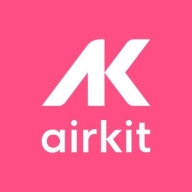

Appian and Airkit compete in the software development platforms category. Appian appears to have the upper hand in scalability and comprehensive features, while Airkit excels in simplicity for building customer interactions. Appian's robust feature set is a key factor, though Airkit's ease of use and fast implementation often proves appealing.
Features: Appian offers low-code automation capabilities, powerful integration options, and extensive scalability for enterprise solutions. Airkit provides an intuitive design interface, strong personalization capabilities, and efficient API management.
Ease of Deployment and Customer Service: Appian supports cloud, on-premise, and hybrid environments with dedicated customer service. Airkit's cloud-based platform is designed for quick execution with support focused on simpler deployment processes.
Pricing and ROI: Appian typically involves higher initial setup costs with ongoing ROI from extensive capabilities and scalability. Airkit's budget-friendly setup and rapid implementation lead to faster ROI, especially for customer interaction use cases.
| Product | Market Share (%) |
|---|---|
| Airkit | 0.7% |
| Genesys Cloud CX | 3.6% |
| Salesforce | 3.1% |
| Other | 92.6% |
| Product | Market Share (%) |
|---|---|
| Appian | 3.5% |
| Camunda | 9.3% |
| IBM BPM | 4.1% |
| Other | 83.1% |

| Company Size | Count |
|---|---|
| Small Business | 20 |
| Midsize Enterprise | 9 |
| Large Enterprise | 44 |
Airkit is a low-code platform designed for creating adaptable customer experiences, enabling organizations to rapidly deploy applications that enhance interaction efficiency. Its intuitive design focuses on streamlining processes and improving user engagement through innovative digital solutions.
Airkit offers a comprehensive suite of tools that enables businesses to transform their digital engagement strategies. Users can build applications tailored to customer needs with minimal coding. It empowers teams to automate workflows and integrates with existing systems seamlessly, ensuring optimal functionality and improving service delivery. With a focus on scalability and flexibility, Airkit supports organizations in delivering consistent, high-quality customer interactions in real-time.
What are Airkit's most important features?Airkit is effectively implemented across sectors like financial services and retail, where quick adaptation to customer demands is crucial. In financial services, it is utilized for automating customer onboarding and enhancing client interactions. Retail businesses use it to personalize shopping experiences, offering seamless support across digital and in-person platforms, meeting a diverse array of industry-specific needs.
Appian is a unified low-code platform and solution used by businesses to build enterprise applications and workflows. This product adapts to the needs of clients and the technologies they are already using to combine their data in a single workflow and maximize resources. The platform has four main components through which it transforms the work process for companies of various sizes. They are:
Appian is utilized across a diverse set of industries, including automotive and manufacturing, energy and utilities, education, financial services, telecom and media, transportation, retail, insurance, healthcare, and life sciences. The most frequent use cases of Appian are customer journey, governance, risk and compliance, operational efficiency, supply chain, distributed order management, and environmental, social, and governance (ESG) management.
Appian Features
Appian has various features that allow users to create solutions for their businesses. These features can be separated into a few groups according to function, including automation, low-code application development, and integrations and data. Some of the most frequently used features of Appian include:
Appian Benefits
The benefits of using Appian include:
Reviews from Real Users
A practice leader - digital process automation at a computer software company values Appian highly because the product is easy to develop, low-code, and has a good user interface.
Alan G., an advisory board member at Codecon VR, Appian offers a clear application life cycle, easy to learn documentation, and comes with a fundamentals course.
We monitor all Customer Experience Management reviews to prevent fraudulent reviews and keep review quality high. We do not post reviews by company employees or direct competitors. We validate each review for authenticity via cross-reference with LinkedIn, and personal follow-up with the reviewer when necessary.